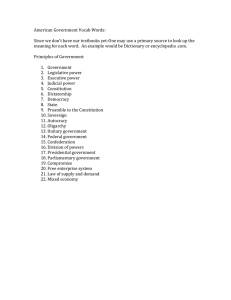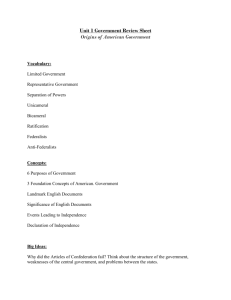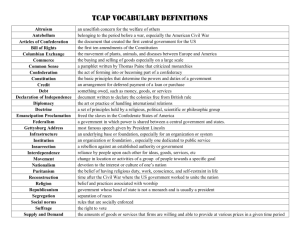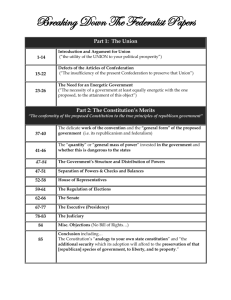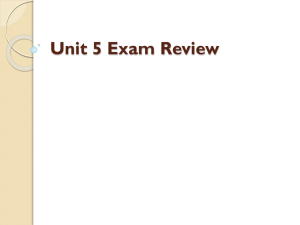Articles of Confederation, U.S. Constitution
advertisement
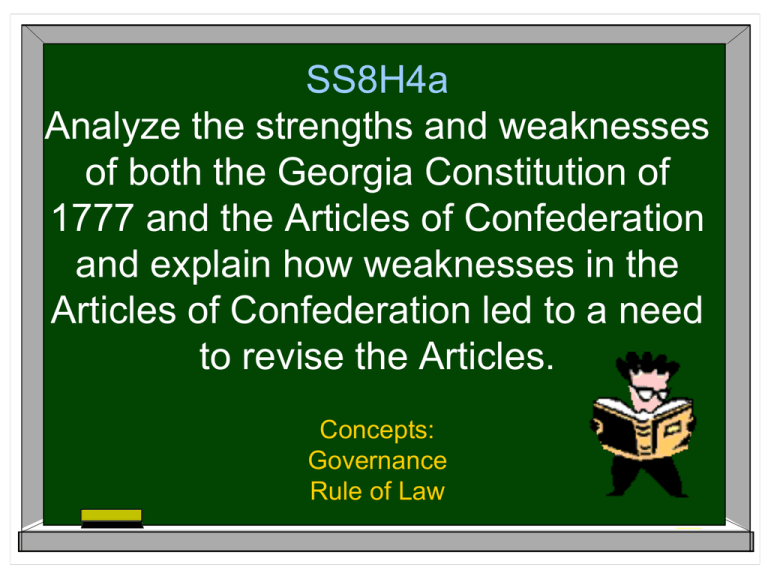
SS8H4a Analyze the strengths and weaknesses of both the Georgia Constitution of 1777 and the Articles of Confederation and explain how weaknesses in the Articles of Confederation led to a need to revise the Articles. Concepts: Governance Rule of Law GEORGIA STATEHOOD and the U.S. CONSTITUTION PAGE 29 IN GEORGIA JOURNAL SS8H4a ESSENTIAL QUESTION What were the strengths and weaknesses of the Georgia Constitution of 1777? Distribution of Power The student will understand that distribution of power in government is a product of existing documents and laws combined with contemporary values and beliefs. How would you describe the distribution of power at Moses Middle School? Which branch of government is responsible for making laws? Why did the writers of the Georgia Constitution of 1777 want to limit the power of the Executive branch (Governor)? GEORGIA CONSTITUTION OF 1777 STRENGTHS • Separation of Powers • 8 Counties (local government) each county had its own government, court, school, and militia • Citizens were guaranteed freedom of religion, press, and trial by jury • • • • WEAKNESSES Uni-cameral legislature (one house) had too much power – appoint (choose) the Governor and judges Governor served only a 1 year term Only white men 21 and over with property could vote Amending (changing) the constitution was difficult Appointed by executive council Very little power Appointed by legislature 1 year term GOVERNOR EXECUTIVE GA Constitution of 1777 STATE JUDGES JUDICIARY LEGISLATIVE Power to appoint Governor and judges LEGISLATORS (lawmakers) Have most of the power Uni-cameral (1 house) called the House of Assembly Primary Source Document GEORGIA CONSTITUTION OF 1777 Article IX. All male white inhabitants, of the age of twenty-one years, and possessed in his own right of ten pounds value, and liable to pay tax in this State, or being of any mechanic trade, and shall have been resident six months in this State, shall have a right to vote at all elections for representatives, or any other officers... SS8H4a Analyze the strengths and weaknesses of both the Georgia Constitution of 1777 and the Articles of Confederation and explain how weaknesses in the Articles of Confederation led to a need to revise the Articles. Concepts: Governance Rule of Law GEORGIA STATEHOOD and the U.S. CONSTITUTION PAGE 30 IN GEORGIA JOURNAL SS8H4a ESSENTIAL QUESTION What were the strengths and weaknesses of the Articles of Confederation? ARTICLES OF CONFEDERATION • • • • STRENGTHS 1st constitution Central government Federalism – power divided between central (national) gov’t and individual state gov’t Congress could: – – – – Declare war Sign treaties Deliver mail Create money WEAKNESSES • • • • • • • • • • • Weak national gov’t State gov’t too strong Uni-cameral legislature (Congress) States only had 1 representative and 1 vote in Congress No executive branch or president No national court system Could not tax the states to raise money Could not regulate (control) trade Could not enforce laws Each state had its own currency and militia Too difficult to amend (change) the Articles CONFLICT & CHANGE The student will understand that when there is conflict between or within societies, change is the result. Do all conflicts have to involve violence and war? How did the Articles of Confederation create a conflict? What changes were needed? READING ACTIVITY • GREEN CRCT COACH BOOK page 218 • CRCT PREP BOOK page 50 • WE THE PEOPLE WORKBOOK page 40 CONFLICT & CHANGE The student will understand that when there is conflict between or within societies, change is the result. Do all conflicts have to involve violence and war? How did the Articles of Confederation create a conflict? What changes were needed? SS8H4b Describe the role of Georgia at the Constitutional Convention of 1787; include the role of Abraham Baldwin and William Few, and reasons why Georgia ratified the new constitution. Concepts: Individuals – Groups – Institutions Governance Conflict and Change Rule of Law GEORGIA STATEHOOD and the U.S. CONSTITUTION PAGE 31 IN GEORGIA JOURNAL SS8H4b ESSENTIAL QUESTION What role did Georgia’s Abraham Baldwin and William Few play in the Constitutional Convention of 1787? CONFLICT & CHANGE The student will understand that when there is conflict between or within societies, change is the result. What does it mean to compromise? Give some examples from your own experiences. Why did states argue about the US Constitution, and what changed as a result? Constitutional Convention of 1787 • Why did our Founding Fathers need to revise the Articles of Confederation? To create a stronger Federal (national / central) government that would UNITE the young country together. • What happened to the Articles of Confederation? The Founding Fathers wrote a new constitution SS8H4b Describe the role of Georgia at the Constitutional Convention of 1787; include the role of Abraham Baldwin and William Few, and reasons why Georgia ratified the new constitution. Concepts: Individuals – Groups – Institutions Governance Conflict and Change Rule of Law ABRAHAM BALDWIN BOTH MEN WERE REPRESENTATIVES FROM GEORGIA WHO HELPED CREATE AND SIGN THE UNITED STATES CONSTITUTION. ABRAHAM BALDWIN PLAYED A BIG ROLE IN THE GREAT COMPROMISE THAT HELPED CREATE A BI-CAMERAL LEGISLATURE WILLIAM FEW HELPED WRITE THE CONSTITUTION WILLIAM FEW CONSTITUTIONAL CONVENTION of 1787 CAUSE EFFECT ARTICLES OF CONFEDERATION THE U.S. CONSTITUTION • State governments had too much power Constitutional Convention of 1787 • National government could not levy taxes, enforce laws, or control trade • Great Compromise: Bi-cameral legislature benefits both big and small states (population) • No executive branch (President) • 3/5ths Compromise: 3 out of 5 slaves counted toward population and were also taxed • No judicial branch (no federal courts to settle disputes between the states) • Bill of Rights: 1st ten amendments to the Constitution guaranteeing rights for citizens • Federal government becomes more powerful • Separation of Powers - Legislative branch makes laws - Executive branch enforce laws - Judicial branch interpret laws • Bi-cameral legislature • House of Representatives based on state population • Senate – 2 representatives from each state BI-CAMERAL 2 REPRESENTATIIVES FROM EACH STATE REPRESENTATIVES FROM EACH STATE BASED ON POPULATION CONFLICT & CHANGE The student will understand that when there is conflict between or within societies, change is the result. What does it mean to compromise? Give some examples from your own experiences. Why did states argue about the US Constitution, and what changed as a result? SS8H4b Describe the role of Georgia at the Constitutional Convention of 1787; include the role of Abraham Baldwin and William Few, and reasons why Georgia ratified the new constitution. Concepts: Individuals – Groups – Institutions Governance Conflict and Change Rule of Law GEORGIA STATEHOOD and the U.S. CONSTITUTION PAGE 32 IN GEORGIA JOURNAL SS8H4b ESSENTIAL QUESTION Why did Georgia ratify the new U.S. Constitution? RATIFYING THE US CONSTITUTION Why did Georgia ratify the new U.S. Constitution? • Wanted federal gov’t to have power to unite the country • Needed federal gov’t to help fight Native Americans in order for Georgians to move westward onto new lands • 4th state to ratify on January 2nd, 1788 RULE of LAW The student will understand that in a democracy, rule of law influences the behavior of citizens, establishes procedures for making policies, and limits the power of government. What are some rules in each of your classes? What are some rules in sports or games that we play? What part of the U.S. Constitution limits the power of government? Distribution of Power The student will understand that distribution of power in government is a product of existing documents and laws combined with contemporary values and beliefs. What are some documents that distribute power? Which branch of government is responsible for making laws? What was wrong with the Articles of Confederation that influenced the states to create a new U.S. Constitution? GOVERNANCE The student will understand that as a society increases in complexity and interacts with other societies, the complexity of government also increases. Think back to elementary school. How are the rules more complex in middle school? Do you think they’ll be more complex in highschool? The 13 states each had their own society and government. What are some examples of states interacting together, which then made the national government more complex? SOURCES • www.Glencoe.com • http://www.fresno.k12.ca.us/divdept/sscien ce/constitutionResouces.html • http://www.usconsulate.org.hk/pas/kids/im ages/branches.jpg • www.milan.k12.mi.us/.../image001.jpg • http://teachingamericanhistory.org/convent ion/christy/
